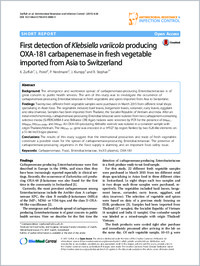First detection of Klebsiella variicola producing OXA-181 carbapenemase in fresh vegetable imported from Asia to Switzerland
- Zurfluh, K. Department of Medicine, Faculty of Science, Medical and Molecular Microbiology Unit, University of Fribourg, Switzerland
- Poirel, Laurent Institute for Food Safety and Hygiene, Vetsuisse Faculty University of Zurich, Switzerland
- Nordmann, Patrice Institute for Food Safety and Hygiene, Vetsuisse Faculty University of Zurich, Switzerland
- Klumpp, J. Institute of Food, Nutrition and Health, ETH Zürich, Switzerland
- Stephan, R. Department of Medicine, Faculty of Science, Medical and Molecular Microbiology Unit, University of Fribourg, Switzerland
-
06.10.2015
Published in:
- Antimicrobial Resistance and Infection Control. - 2015, vol. 4, p. 38
English
Background: The emergence and worldwide spread of carbapenemase-producing Enterobacteriaceae is of great concern to public health services. The aim of this study was to investigate the occurrence of carbapenemase-producing Enterobacteriaceae in fresh vegetables and spices imported from Asia to Switzerland.Findings: Twenty-two different fresh vegetable samples were purchased in March 2015 from different retail shops specializing in Asian food. The vegetables included basil leaves, bergamont leaves, coriander, curry leaves, eggplant and okra (marrow). Samples had been imported from Thailand, the Socialist Republic of Vietnam and India. After an initial enrichment-step, carbapenemase-producing Enterobacteriaceae were isolated from two carbapenem-containing selective media (SUPERCARBA II and Brilliance CRE Agar). Isolates were screened by PCR for the presence of bla KPC, bla NDM, bla OXA-48-like and bla VIM. An OXA-181-producing Klebsiella variicola was isolated in a coriander sample with origin Thailand/Vietnam. The bla OXA-181 gene was encoded in a 14′027 bp region flanked by two IS26-like elements on a 51-kb IncX3-type plasmid.Conclusions: The results of this study suggest that the international production and trade of fresh vegetables constitute a possible route for the spread of carbapenemase-producing Enterobacteriaceae. The presence of carbapenemase-producing organisms in the food supply is alarming and an important food safety issue.
- Faculty
- Faculté des sciences et de médecine
- Department
- Médecine 3ème année
- Language
-
- English
- Classification
- Biological sciences
- License
-
License undefined
- Identifiers
-
- RERO DOC 258402
- DOI 10.1186/s13756-015-0080-5
- Persistent URL
- https://folia.unifr.ch/unifr/documents/304859
Statistics
Document views: 79
File downloads:
- pdf: 136
